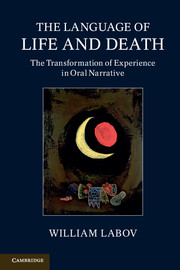Book contents
- Frontmatter
- Contents
- Preface
- Acknowledgments
- 1 Introduction to the language of life and death
- 2 Narrative analysis
- 3 The escalation of violence
- 4 Confrontations with death
- 5 Premonitions and communication with the dead
- 6 Margie Knott: “Her confrontation with the neighbors”
- 7 Gloria Stein: “They stoned the house”
- 8 Rose Norman: “The death of her younger sister”
- 9 Mary Costa: “The death of her youngest daughter”
- 10 Cache County
- 11 The vernacular origin of epic style
- 12 Historians' use of narrative
- 13 Thomas Babington Macaulay: “The death of Monmouth”
- 14 S. T. Bindoff: “The death of Elizabeth”
- 15 2 Samuel: “The death of Absalom”
- 16 The narrative view of death and life
- References
- Index
2 - Narrative analysis
Published online by Cambridge University Press: 05 June 2013
- Frontmatter
- Contents
- Preface
- Acknowledgments
- 1 Introduction to the language of life and death
- 2 Narrative analysis
- 3 The escalation of violence
- 4 Confrontations with death
- 5 Premonitions and communication with the dead
- 6 Margie Knott: “Her confrontation with the neighbors”
- 7 Gloria Stein: “They stoned the house”
- 8 Rose Norman: “The death of her younger sister”
- 9 Mary Costa: “The death of her youngest daughter”
- 10 Cache County
- 11 The vernacular origin of epic style
- 12 Historians' use of narrative
- 13 Thomas Babington Macaulay: “The death of Monmouth”
- 14 S. T. Bindoff: “The death of Elizabeth”
- 15 2 Samuel: “The death of Absalom”
- 16 The narrative view of death and life
- References
- Index
Summary
It is generally agreed that a narrative is the presentation in discourse of a sequence of past events. In discussions of fiction and drama, this sequence is often referred to as the plot. Dating from Aristotle's definition of the plot of a tragedy, it is also agreed that this sequence does not begin or end by chance, but has a beginning, a middle and an end recognized by some principle, so that the listener knows when a narrative has begun and when it has ended. This chapter will develop a tool kit for the analysis of oral narratives of personal experience. It builds upon the foundation laid in L&W in 1967 as well as the work of other narratologists, with an eye to answering the questions raised in Chapter 1. One might work towards a theory of narrative construction founded on formal syntactic analysis, but that is not the goal here. Many of the questions that are raised are issues of human values, involving concepts like reportability, tellability, credibility, objectivity, polarization and integration. In building this foundation, I will be drawing upon a number of grammatical distinctions that are rarely recognized in the narratological literature: the difference between coordinate and subordinate conjunctions; between realis and irrealis moods; between progressive and punctual aspects. The comparative and the negative will play a major role in this analysis, and the semantics of many verbs peculiar to English. Since many of my readers will be drawn from the humanities and social sciences outside of linguistics, I will try to define and exemplify each of these as they are introduced, hoping that linguists will be willing to pass over material that is second nature to them.
- Type
- Chapter
- Information
- The Language of Life and DeathThe Transformation of Experience in Oral Narrative, pp. 14 - 43Publisher: Cambridge University PressPrint publication year: 2013
- 3
- Cited by



